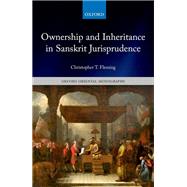Ownership and Inheritance in Sanskrit Jurisprudence
, by Fleming, Christopher T.- ISBN: 9780198852377 | 0198852371
- Cover: Hardcover
- Copyright: 2/10/2021
Ownership and Inheritance in Sanskrit Jurisprudence provides an account of various theories of ownership (svatva) and inheritance (daya) in Sanskrit jurisprudential literature (Dharmasastra). It examines the evolution of different juridical models of inheritance--in which families held property in trusts or in tenancies-in-common--against the backdrop of related developments in the philosophical understanding of ownership in the Sanskrit text-traditions of hermeneutics (Mima?sa) and logic (Nyaya) respectively.
Christopher T. Fleming reconstructs medieval Sanskrit theories of property and traces the emergence of various competing schools of Sanskrit jurisprudence during the early modern period (roughly fifteenth-nineteenth centuries) in Bihar, Bengal, and Varanasi. Fleming attends to the ways in which ideas from these schools of jurisprudence shaped the codification of Anglo-Hindu personal law by administrators of the British East India Company during the late eighteenth and early nineteenth centuries. While acknowledging the limitations of colonial conceptions of Dharmasastra as positive law, this study argues for far greater continuity between pre-colonial and colonial Sanskrit jurisprudence than accepted previously. It charts the transformation of the Hindu law of inheritance--through precedent and statute--over the late nineteenth, twentieth, and early twenty-first centuries.
Christopher T. Fleming reconstructs medieval Sanskrit theories of property and traces the emergence of various competing schools of Sanskrit jurisprudence during the early modern period (roughly fifteenth-nineteenth centuries) in Bihar, Bengal, and Varanasi. Fleming attends to the ways in which ideas from these schools of jurisprudence shaped the codification of Anglo-Hindu personal law by administrators of the British East India Company during the late eighteenth and early nineteenth centuries. While acknowledging the limitations of colonial conceptions of Dharmasastra as positive law, this study argues for far greater continuity between pre-colonial and colonial Sanskrit jurisprudence than accepted previously. It charts the transformation of the Hindu law of inheritance--through precedent and statute--over the late nineteenth, twentieth, and early twenty-first centuries.







